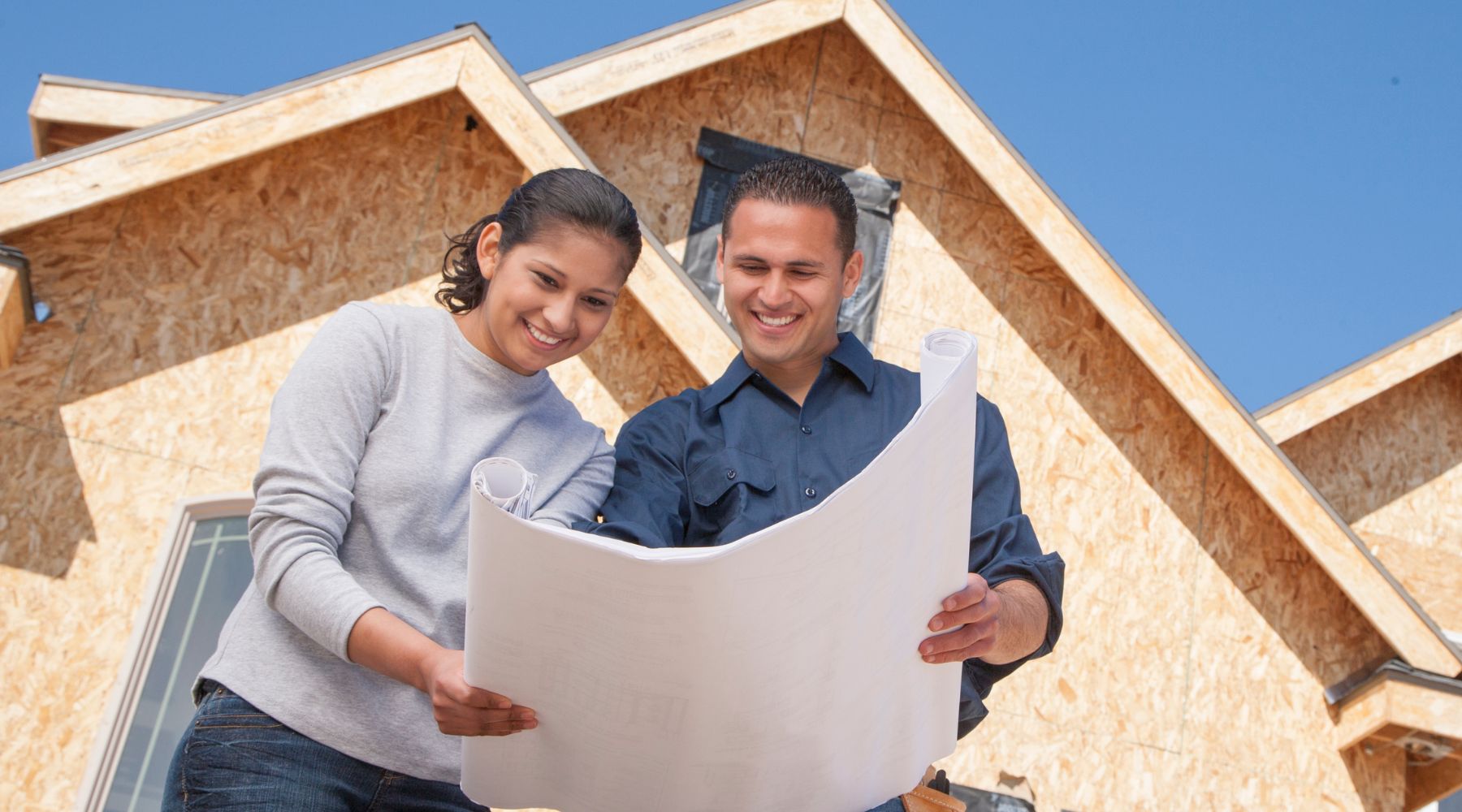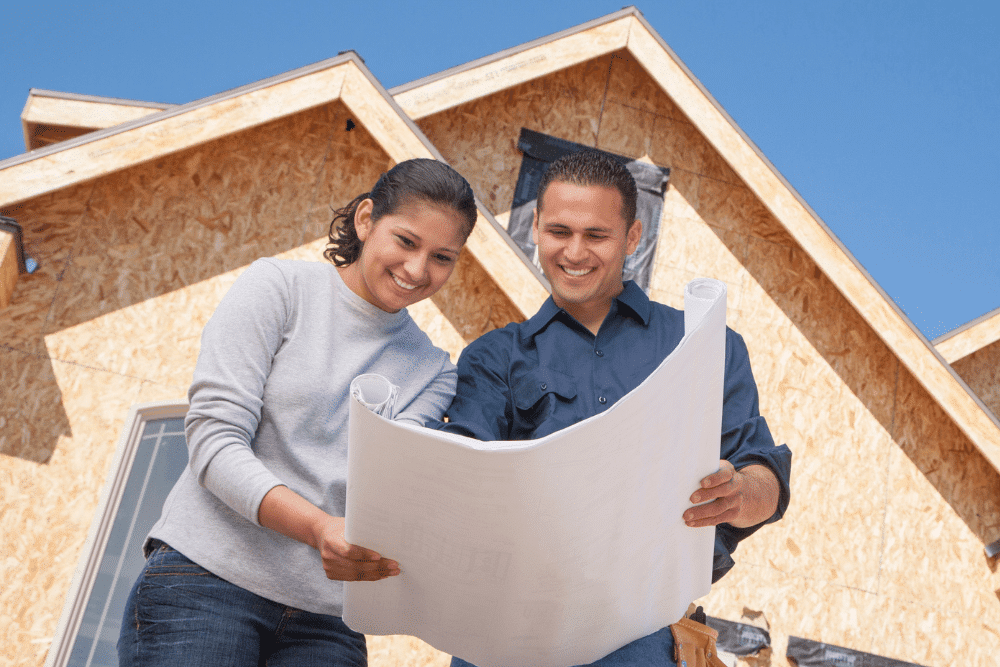Whether you’re building your next property or renovating your existing one, paying your builder adds a layer of complexity compared to a standard home purchase. To account for this, lenders offer construction loans that cater to the specific needs of those in the building process.
How do construction loans work?
Construction loans are a special type of home loan designed to meet your building requirements. Unlike regular mortgages that are paid to the vendor in full upon settlement, construction loans are paid out in stages to your builder to continue to fund the project. These are known as progress payments.
You’ll typically make interest-only payments until the final progress payment is made (or up to a set timeframe, such as 12 months), after which it reverts to a regular principal and interest loan.
However, there are different requirements depending on the nature of the construction. For example, if you’re taking out a house and land package, you’ll essentially need two loans (your land loan and construction loan) which can be combined into one when your property is built. If you’re buying land first and building later, you’ll be looking at a regular home loan until construction begins. This is because construction loans come with a set timeframe.
If you’re renovating via a knockdown rebuild, you can choose to either take out a new construction loan with your spare funds or borrow against your home equity. The latter option may offer more flexibility but will often mean that you’re paying heightened interest from the get-go. More minor renovations may only require a small top-up using your home equity.
Progress payments
These payments are paid out by your lender directly to your builder. Although there may be minor differences between lenders, the stages at which progress payments are usually made are:
- Deposit stage: the initial amount paid to your builder. This is generally 5% of the total cost.
- Slab or base stage: at this point, the foundations are laid. 15% is typically paid at this step, although the deposit may be included in this step to bring it up to 20%.
- Frame stage: another 20% is paid as the skeleton of your home is completed, including wooden or metal framing, insulation, walls and supports.
- Lock-up stage: windows and doors are installed so that the house can be fully closed off. 20% is usually paid here as well.
- Fit-out stage: this is where all the internal fittings are installed, such as electrical and plumbing fixtures. It’s the largest step from a payment perspective, requiring 30% of the cost.
- Completion stage: once all the contracted fittings and fixtures are completed (and the house is painted), you’re pretty much ready to go. This is the final progress payment, worth 10%.
Construction loan interest rates
In most cases, you can expect to receive a higher interest rate on a construction loan than a standard home loan. This is because the risk profile is greater for vacant blocks of land than completed homes, as they could encounter difficulties throughout the construction process.
Just because it’s a construction loan, though, doesn’t mean that you can’t get a competitive interest rate. There’s a wide range of lenders out there waiting to work with you; it’s all about knowing the best places to look. When you apply for your loan with a mortgage broker like Savvy, your consultant will compare offers from a wide range of lending partners to find the best available deal for you.
Fixed vs variable interest
In almost all cases, construction loans will come with variable interest rates. These rates are the most flexible and suitable for drawing down on the debt to make progress payments. However, some lenders do offer fixed interest rates on construction loans.
If you’re keen to lock your rate in ahead of building your new house, speak with your Savvy mortgage broker to find out if any of our mortgage partners offer them.
What happens if interest rates change before construction?
If you’ve taken out a construction loan with a variable rate and your lender raises its rate before the completion of your term, you’ll have to pay the increased rate. Rate adjustments will always impact your repayments when you have variable interest, but the good news is that it means you’ll benefit if your lender drops their rates.
You may also find that rate rises may directly or indirectly impact the cost of construction. In most cases, you won’t be liable to pay the increased cost, as everything will be agreed upon within your contract. However, if there’s a rise and fall clause (which are rare), these costs could be passed on to you.
If your builder attempts to increase the cost payable by you without a valid reason, you may be able to dispute it with your state or territory housing or construction body or seek legal advice.
Why apply for a home loan with Savvy
Help throughout the process
You'll be matched with an experienced mortgage broker who'll handle all the hard work for you from start to finish.
Trusted lenders
With a panel of reputable mortgage lenders, you can rest assured you'll be comparing high-quality options with your broker.
Paperless quote process
You can fill out a simple online quote via our form without having to worry about sorting through heaps of paperwork.
The pros and cons of construction loans
Pros
-
Interest-only payments until completion
You only have to pay your construction loan’s interest up until the completion of the build, freeing up more funds in the early stages of the project.
-
Progress payments stagger debt
Rather than start paying the whole debt down straight away, you’ll only chip away at the interest on what’s been drawn down until construction is completed.
-
More control over the process
Taking out a construction loan, and building your house more broadly, allows you to be more involved in the process and pick and choose building materials and builders themselves.
Cons
-
Higher interest and fees
You’ll likely have to pay more in interest overall than a home loan of the same size, as rates and fees are often higher and interest-only payments don’t pay down your debt.
-
Potential cost overruns
Building your home from the ground up can present some challenges, including the potential for budgets to be blown out and increasing the cost of your construction loan in the process.
-
Stricter time limit
Construction loans are only built to last until the build is completed. This means yours could expire after 12 to 24 months, after which point you may need to find alternative options.
Construction loan tips
-
Make sure everything is within your budget
Perhaps the most important thing to do is thoroughly budget for the cost of the build, including your construction loan repayments during the process and any additional expenses not covered like increased footing costs.
-
Leave room for an increase in costs
As mentioned, there’s a lot that can change over 18 months to two years. Make sure you give yourself a safety buffer if construction costs increase during your term (unless you have a fixed price contract).
-
Research builders carefully
Finding yourself stuck with an unreliable builder could lead to delays and potentially significant financial impacts. Take the time to find one that has a positive reputation and who you can trust.
-
Know what is and isn’t included in your building contract
Many builders won’t include things like landscaping and driveways in the building contract, meaning you’ll have to organise it yourself. Make sure you’re aware of any such omissions and let your lender know if you want to include them in your loan.
Construction loan experience
Before signing up to your build, ensure that you ask the builder any and every question you can think of, no matter how small. Be sure to get things in writing, too. Know what your inclusions are inside out so that you can budget for items that aren’t included and discuss with your broker how you’ll be best to fund these.
Once your build nears completion, keep in mind that you’ll be paying 90% of your mortgage and potentially paying for where you’re currently living. Also, be prepared for delays. As frustrating as it is, most builds run longer than promised. Mine ended up taking six months longer than expected. That’s tough if you're trying to line up a lease or the sale of another property.
Aaron McAllister, Digital Marketing Manager – Savvy
How to apply for a construction loan online with Savvy
-
Share how much you’re paying for the property
Fill out the estimated purchase price of the land and construction, as well as how much you’re putting down as a deposit.
-
Nominate the type of property and its purpose
Next, you can confirm the type of property you’re purchasing (in this case, either a house and land package or land) and whether it’s an owner-occupier or investment loan.
-
Confirm whether you’re a first-time buyer
Being a first homebuyer may entitle you to a range of benefits and government programs, such as stamp duty relief and government grants.
-
Choose between interest-only and principal and interest
Although most construction loans come with interest-only payments, you can select principal and interest payments if you prefer and your broker can see what’s available.
-
Tell us about your credit history
Let us know if you’ve had any issues with your credit in the past. This will help us work out which options may be best for you, especially if you’ve had struggles in the past.
-
Provide your phone number and complete the quote
Once this is completed, simply input your phone number and one of our brokers will get in touch with you to discuss your home loan situation.
- Buying or building a new home - HomeGrown Territory - Northern Territory Government
- Your Guide to Construction Loans - ANZ























